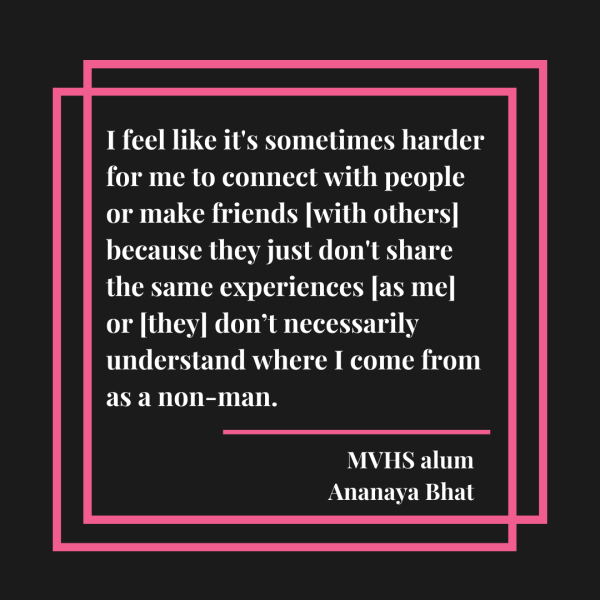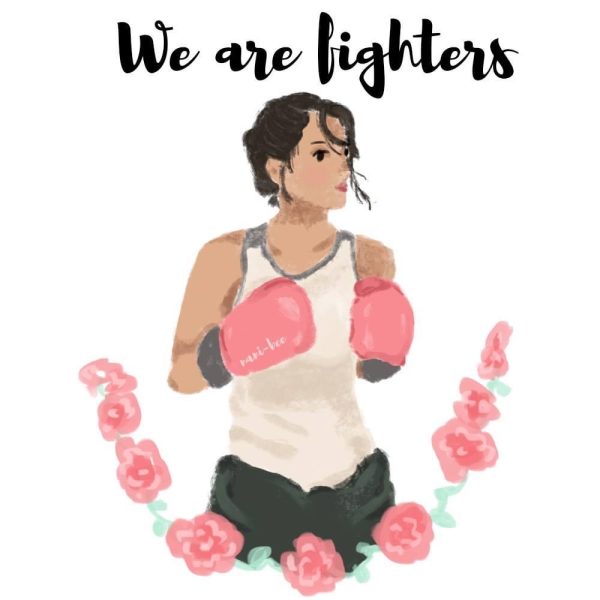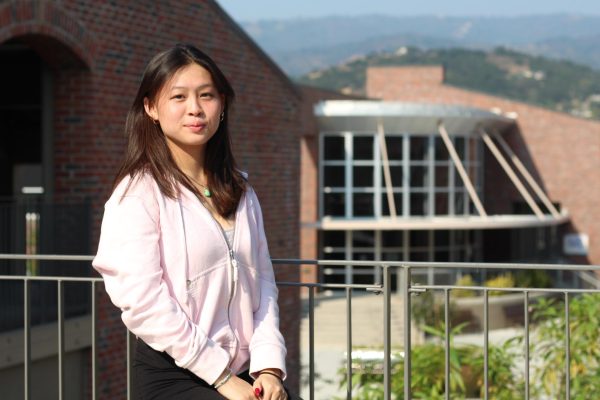MVHS alum ‘18 Ananya Bhat attended camp during the summer before 8th grade, wearing a bright sleeveless yellow dress, ready to learn about coding. However, as the camp progressed, they quickly realized that all the other students were male, including the teacher. What they encountered reflects the experience of countless women in STEM.
“I don’t think I made any friends [during that camp] because I just felt so different,” Bhat said. “I stuck out and nobody seemed to want to talk to me. Because it’s a predominantly male field, the women in the field really stick together. There’s a very strong community of women that you can rely on.”
To MVHS alum ‘22 Anushka De, the word “feminist” is more than just a movement. De defines the word as the fight for equal opportunity for women and other gender minorities. As a self-proclaimed feminist, De emphasizes the importance of strong female representation and support.
“I think a big part about feminism is also understanding that as a woman, you have a responsibility within yourself to uplift [other women],” De said. “[It’s important to] use the lessons that you’ve [learned] to help [others] do better and feel better about themselves.”
De’s definition of feminism evolved during her junior year of high school when she took Honors American Literature. The curriculum included a feminism unit and highlighted works of writing such as Peggy Orenstein’s “Girls & Sex,” which De believes shaped her view on the feminist movement.
“It was HAmLit that helped me realize a lot of inequality is shaped by the way we think about the world and about different groups of people,” De said. “The reason this need for feminism is so imminent is because we don’t think about women the same way that we think about men in almost [every] capacity.”
During discussions in her literature classes, De also observed the ways in which people debated issues affecting the world. She felt that class dialogues were often repeating the same concepts over and over again and not making much progress in finding solutions, which she believes happened because students in her classes had not been exposed to differing opinions.

“I think that learning about different perspectives at a young age is incredibly important, not just because it’s important to be a feminist but also because it’s important to understand that there are different schools of thought, and you are allowed to decide for yourself what you think,” De said. “And the only way that you can decide for yourself what you think is by being exposed to many things.”
Currently, Bhat works as a Software Engineer at Microsoft with a fully male team. As a self proclaimed feminist, Bhat believes that women deserve the same rights as all other people. When working in the STEM field, Bhat has come to recognize the importance of organizing separate spaces and resources for women to flourish, especially in male-dominated fields.
“I feel like it’s sometimes harder for me to connect with people or make friends [with others] because they just don’t share the same experiences [as me] or [they] don’t necessarily understand where I come from as a non-man,” Bhat said. “Having those spaces where you can talk to, share or bond with people who have your shared experiences [requires] some amount of representation. I think representation can help you realize what you’re capable of and empower you to do what you might not think you are capable of.”
Though the origin of the word aims to uplift a minority group, sophomore Kush Mathur feels that the word “feminist” is sometimes being used to degrade people, diverging from its original intent.
“Just a few weeks ago, I was in a classroom trying to help another student who happened to be a girl,” Mathur said. “She said, ‘Oh, did you not think I’m capable of this? Are you being an anti-feminist?’ And that wasn’t my intention at all… [Helping a girl doesn’t] make me anti-feminist. The whole definition [of the word ‘feminist’ is] to make sure we don’t undervalue the importance of [women’s] rights. [When this situation happens for] the person offering help, it not only degrades them, but it also just negatively influences how we use that word today. I don’t think we should just be throwing it around loosely.”
De agrees with Mathur, saying that the change has mostly been caused by more and more people taking the word out of context. She uses “Barbie” as an example to depict the careless use of the word.
“I think a lot of people who didn’t like the Barbie movie were stitched by people who [said], ‘If you [didn’t] like the Barbie movie, you’re anti-feminist,’” De said. “And it’s conflating something that obviously was a work that centered on women and some of the struggles that they face. If you look for people who are conflating a [movie with a movement], you’ll always find people who take the word out of context.”
De believes the politicization of the word gained traction when Donald Trump was elected as president. Bhat adds that Trump’s election generated a movement of women who banded together against him, based on his outward statements on gender inequality.
“In 2016, Donald Trump was elected president, and I remember that day I felt so emotional,” Bhat said. “I didn’t go to school because I was so upset [and disheartened] at the fact that someone who was so clearly against so many of the values [and the] groups that I myself am a part of [became president].”

Fueled by their anger at Trump’s election, Bhat created a piece of artwork to spread the message that the feminist movement would continue to fight against any struggles that stood in their way. They became worried that Trump would aim to defund Planned Parenthood — which they feel directly correlates with the feminist movement — and decided to sell prints of the artwork online, with all profits being donated to Planned Parenthood.
Bhat’s exposure to various women’s movements allowed them to attend a Women’s March in San Jose in 2017, where they brought posters of their artwork and slogans to display at the march. For Bhat, attending the protest with their family created a feeling of strength.
“[Attending the march] was very empowering,” Bhat said. “In this huge space of women and men supporting women, [I felt] the concept of female rage. It was like this concept of us all being really angry together and like ‘We can fight the system!’ [It was a] good [type of] angry [and it] felt very powerful.”
Ultimately, Bhat hopes that more people will begin to label themselves as feminists. They claim that a common misconception attached to being a feminist is that feminists hate men. However, they explain women have had less rights for centuries, which is why the movement centers around women, even though the goal of the feminist movement is equality for all genders.
“[I would hope] most people nowadays would claim that they’re feminists, including many men, because they realize and understand that the feminist movement is not trying to detract anything,” Bhat said. “[The feminist movement] is literally just trying to say, ‘We want non-men to have the same equal rights as men.’”















